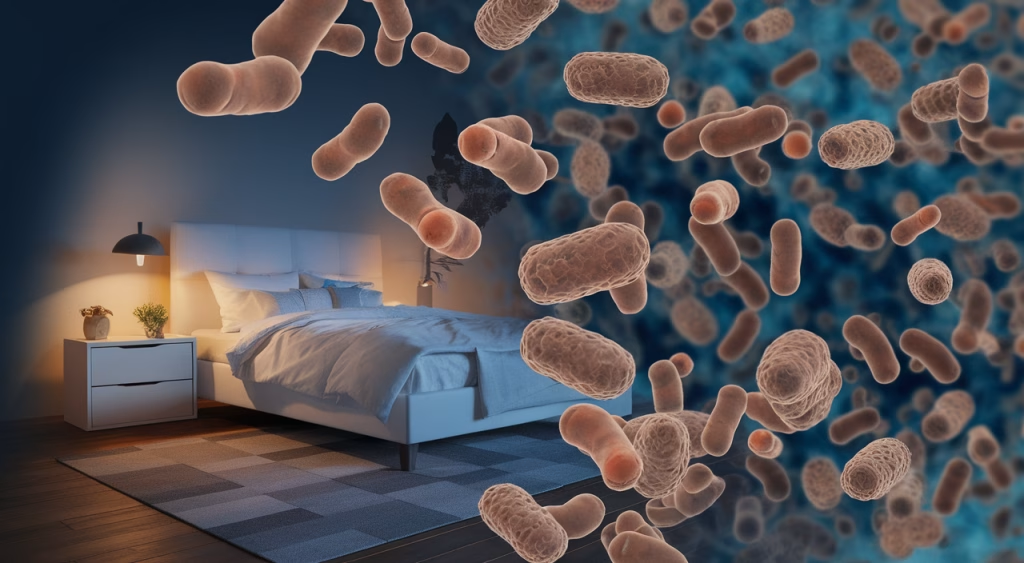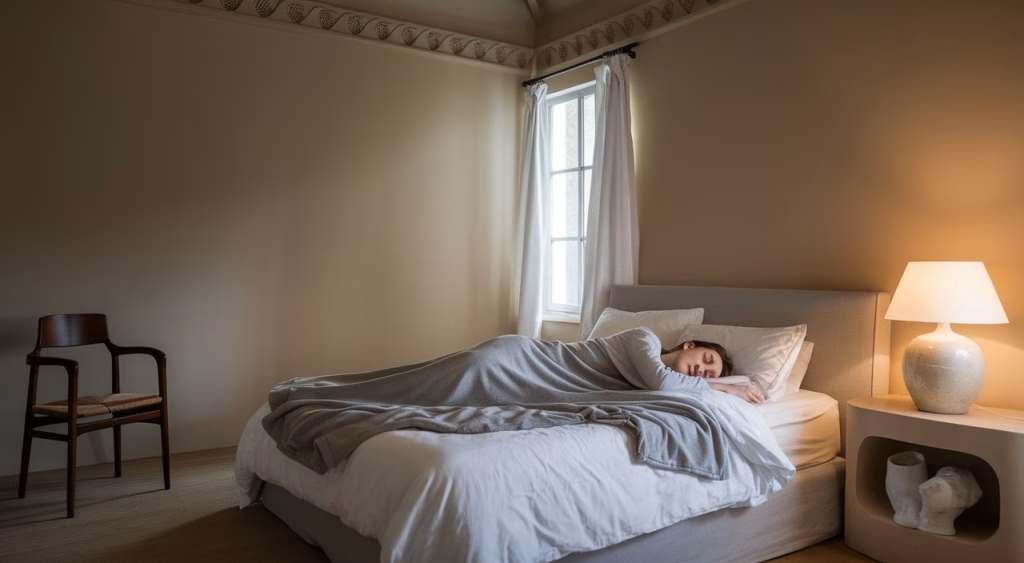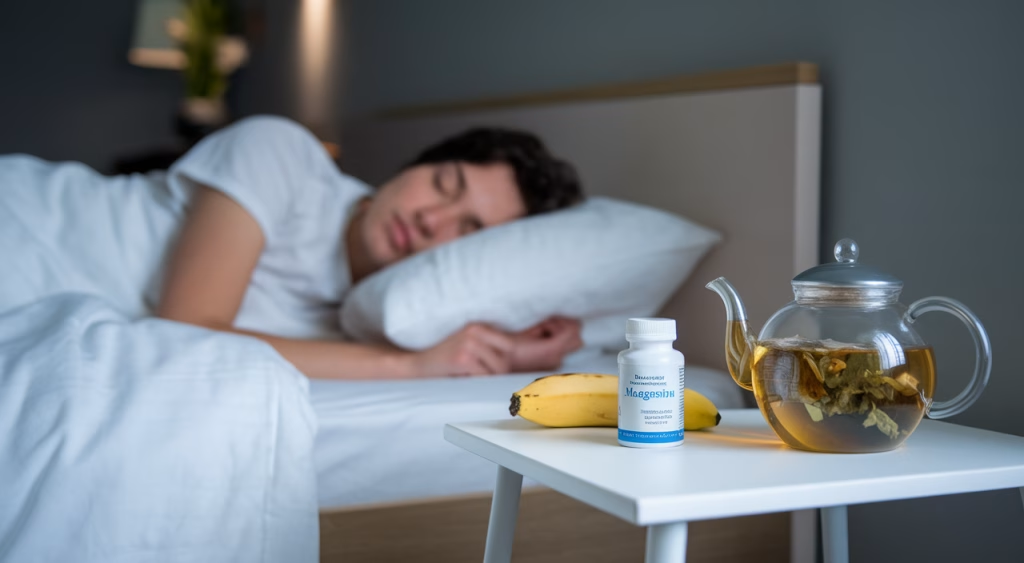Can Your Gut Microbiome Really Control Your Sleep—and Even Sleep Apnea?
The short answer? Absolutely, and the connection runs deeper than most people realize. The emerging science around your gut microbiome’s role in obstructive sleep apnea (OSA) reveals that the bacteria living in your digestive system could be the hidden trigger behind your restless nights and breathing disruptions.
TL;DR: Summary
- Your gut microbiome directly regulates sleep hormones and brain signals, controlling how well you sleep and breathe at night.
- Obstructive Sleep Apnea (OSA) isn’t just about blocked airways—it often starts with gut microbiome imbalances that trigger inflammation.
- Dysbiosis, or unhealthy gut bacteria balance, inflames your airways and worsens sleep apnea symptoms throughout the night.
- Natural remedies for sleep apnea like targeted probiotics and a gut microbiome diet can dramatically improve sleep quality.
- Simple lifestyle changes, including specific foods and avoiding gut-damaging habits, help restore healthy gut microbiome for better sleep.
1. Understanding Obstructive Sleep Apnea
Obstructive Sleep Apnea goes far beyond loud snoring. Picture your airway collapsing like a kinked garden hose—you literally stop breathing, sometimes hundreds of times each night. Your body jolts awake, gasps for air, and the cycle repeats, leaving you exhausted and your health deteriorating.
But here’s what most people don’t know: researchers studying obstructive sleep apnea are discovering that your gut microbiome plays a starring role in this nightly drama.
2. How Your Gut Microbiome Impacts Sleep Quality
Your gut microbiome isn’t just processing food—it’s manufacturing the very chemicals that control your sleep. Those 100 trillion bacteria in your digestive system are constantly sending signals to your brain, regulating sleep hormones like melatonin and serotonin, and controlling inflammation throughout your body.
When you’re struggling with fragmented sleep or feel exhausted despite spending hours in bed, the problem might not originate in your bedroom—it could start in your gut. This connection is especially crucial for people with obstructive sleep apnea, where gut microbiome imbalances fuel the inflammation and breathing disruptions.
How Gut Microbiome Controls Sleep Hormones
Your gut microbiome produces GABA (gamma-aminobutyric acid), the brain’s primary calming neurotransmitter. When harmful bacteria outnumber the beneficial ones, this crucial brain-gut communication breaks down, making it nearly impossible to achieve deep, restorative sleep cycles.
3. Discovering the Gut Microbiome Connection to Sleep
Your gut microbiome is like a bustling ecosystem—trillions of bacteria, fungi, and viruses working together to keep you healthy. When this community thrives in balance, it performs miraculous functions: digesting nutrients, fighting off harmful pathogens, and producing mood-stabilizing chemicals that directly improve sleep quality.
Unfortunately, modern life wages war against your gut microbiome. Processed foods, chronic stress, antibiotic overuse, and lack of fiber create dysbiosis—a dangerous imbalance that disrupts your natural sleep patterns and can trigger obstructive sleep apnea.
How Gut Microbiome Dysbiosis Triggers Sleep Apnea
Multiple studies reveal that people with obstructive sleep apnea consistently show specific gut microbiome imbalances. Poor sleep quality increases inflammatory bacteria in your gut, which then releases inflammatory compounds that swell your upper airways. This creates a vicious cycle where gut problems worsen sleep apnea, and sleep apnea further damages your gut microbiome.
| Trigger | Gut Microbiome Effect | Sleep Impact |
|---|---|---|
| Processed foods and refined sugars | Destroys beneficial gut bacteria | Disrupts melatonin production, causes restless sleep |
| Frequent antibiotic use | Eliminates protective microbes | Reduces sleep hormone balance |
| Chronic inflammation | Feeds harmful gut bacteria | Worsens obstructive sleep apnea episodes |
4. The Gut Microbiome and Sleep Disorders Connection
Have you noticed your sleep quality plummeting after a course of antibiotics or a week of eating poorly? That’s your gut microbiome sending distress signals to your brain. This gut-brain axis communication is especially critical when you’re dealing with sleep disorders like obstructive sleep apnea.
Research shows that people with OSA have elevated levels of inflammatory bacteria (particularly Firmicutes) while beneficial sleep-supporting species (like Bifidobacteria) are significantly depleted. This gut microbiome imbalance doesn’t just affect your sleep—it’s been linked to depression, high blood pressure, and metabolic disorders that make sleep apnea worse.
How Your Gut Microbiome Controls Natural Sleep Cycles
When your gut microbiome rhythms are disrupted, your entire sleep-wake cycle suffers. Since 90% of serotonin (the precursor to sleep hormone melatonin) is produced in your gut, compromised gut bacteria directly translate to poor sleep hormone production and fragmented sleep patterns.
5. Natural Remedies for Sleep Apnea: Healing Your Gut Microbiome
Here’s the encouraging news: your gut microbiome is remarkably adaptable. With targeted natural remedies for sleep apnea and strategic lifestyle changes, you can rebalance your bacterial ecosystem, reduce inflammation, and improve sleep quality through gut health restoration.
The Gut Microbiome Diet for Better Sleep
- Increase fiber-rich foods: Load up on leafy greens, berries, oats, and flaxseeds. These feed the beneficial bacteria that produce sleep-enhancing compounds.
- Add targeted probiotics: Choose fermented foods like unsweetened yogurt, kimchi, and sauerkraut that contain sleep-supporting Lactobacillus and Bifidobacterium strains.
- Eliminate gut microbiome disruptors: Cut out refined sugars, alcohol, and processed foods that feed harmful bacteria and sabotage sleep quality.
Natural Remedies for Sleep Apnea That Target Your Gut
- Follow a diverse, plant-based gut microbiome diet to reduce airway inflammation
- Establish consistent sleep schedules and morning sunlight exposure to support natural circadian rhythms
- Practice stress-reduction techniques like deep breathing and meditation, which directly benefit gut-brain communication and sleep quality
Cost Guide: Investing in Gut-Healthy Sleep
| Budget Range | What You Get |
|---|---|
| Low-End ($20–$50/month) | Basic probiotics, whole-foods diet, homemade fermented foods |
| Mid-Range ($75–$150/month) | Specialist-guided gut assessments, targeted sleep support supplements |
| High-End ($200+/month) | Personalized microbiome testing, professional sleep coaching, nutrition therapy |
Final Thoughts: Transform Your Sleep by Healing Your Gut Microbiome
Your gut microbiome never sleeps, but it holds the master key to how well you do. By understanding this powerful gut-sleep connection and implementing natural remedies for sleep apnea that target your digestive health, you can break free from the cycle of poor sleep and breathing disruptions. The path to better sleep starts in your gut—and the journey begins with your very next meal.
Frequently Asked Questions
-
Can fixing my gut microbiome really reduce sleep apnea symptoms?
Yes, by reducing inflammation and improving gut-brain signaling, a healthier microbiome can ease apnea severity and enhance sleep quality.
-
Are there specific foods that improve sleep for OSA sufferers?
Foods high in fiber, antioxidants, and prebiotics like berries, leafy greens, and fermented foods support gut microbes that promote better sleep.
-
How long does it take to see real results?
While some improvements may be seen in a few weeks, lasting results typically take 6–12 weeks of sustained dietary and lifestyle commitment.
-
Should I avoid antibiotics entirely if I have OSA?
No, antibiotics should be used when needed. But overuse or unnecessary prescriptions can disrupt your gut microbiota, worsening symptoms.
-
What natural supplements help both the gut and sleep?
Probiotics with Lactobacillus and Bifidobacterium strains, magnesium, and L-theanine may enhance both gut balance and restful sleep.
-
Is melatonin safe to use while treating gut issues?
Usually yes, but long-term use might mask underlying imbalances. Consult a healthcare provider for safe guidance.
-
Can kids with sleep apnea be helped through gut health changes?
Potentially, yes. Improving gut health early may support immune and metabolic systems linked to sleep quality. Always check with a pediatrician.





